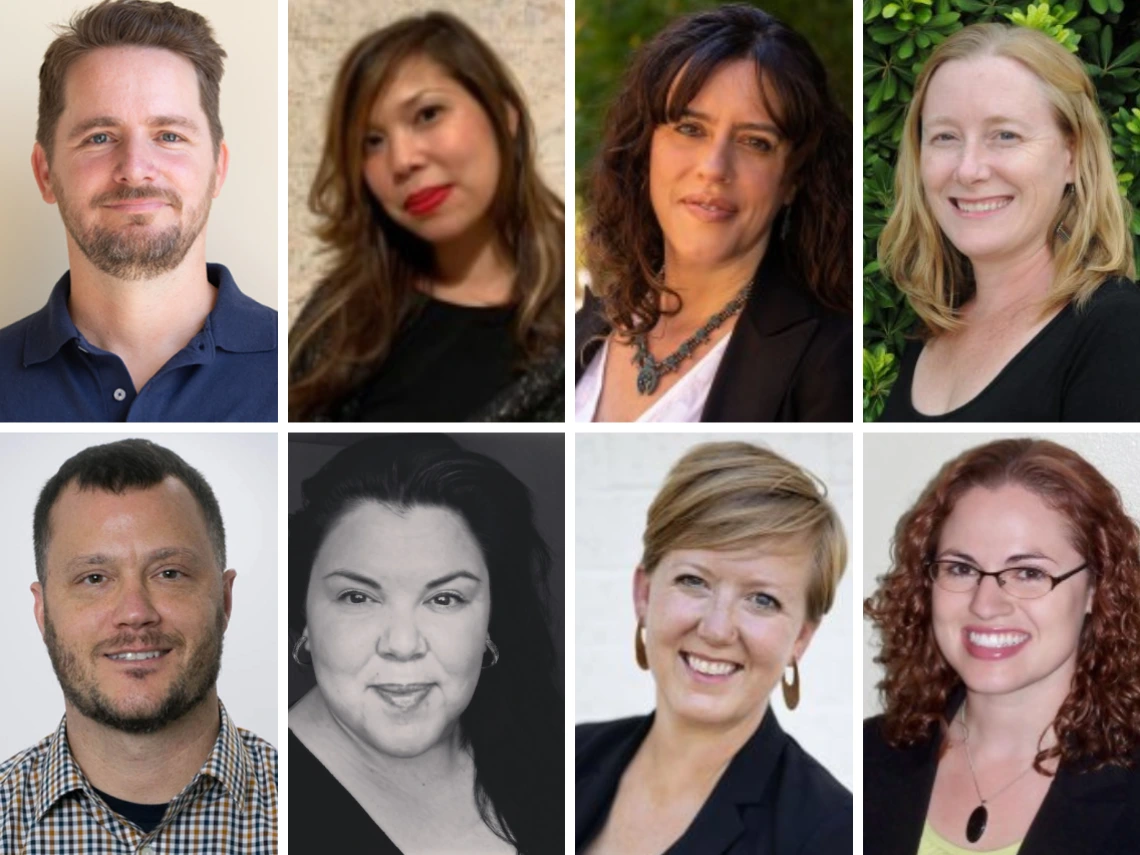Congratulations to the first Digital Borderlands in the Classroom cohort!
New program integrates library services, teaching, and student research on the U.S.-Mexico borderlands

Pictured left to right (upper row): Braithwaite, Barrios, Gorman, Gutierrez (lower row): Jurjevich, Martinez, Ozias, Slominski
Training and curriculum development begin in July
We are pleased to announce the 2024-2025 cohort of the Digital Borderlands in the Classroom Faculty Fellowship Program and Summer Institute.
Funded by a $1.2 million grant awarded to the Libraries from the Mellon Foundation, the institute will strengthen University of Arizona faculty development and student learning while advancing the university’s commitment to borderlands research and supporting Hispanic-Serving Institution (HSI) initiatives.
Eight University of Arizona faculty members were chosen through a competitive process to participate in the first of three Fellowship cohorts that will be selected annually.
Each Fellow receives funding, training, and support from library experts in archival research and digital scholarship over an 18-month period to develop curricular materials for undergraduate and graduate student research on the borderlands. As a result, students will have opportunities to use a wide range of library resources to study and learn more about the region, as well as conduct research.
The training kicks off in July with a week-long summer institute held on campus. Fellows will learn about the Libraries’ distinctive borderlands collections, various digital scholarship tools and methods, and culturally responsive pedagogy strategies to inform how they can be incorporated into assignments that provide more meaningful learning experiences to students.
University Libraries Dean Shan Sutton, the grant’s principal investigator, said that helping instructors know how they can partner with the Libraries in the future regarding their instruction and research is pivotal.
“We are thrilled with the number of applicants, as well as the quality and thoughtfulness of their proposals,” Sutton said. “This cohort represents a broad range of colleges and disciplines, which fulfills our vision of facilitating student research on the borderlands across campus through the integration of library services.”
Students may encounter data in a variety of forms–from printed maps to oral history recordings to digitized census records–which can be combined to serve as evidence for a range of digital storytelling efforts, said Megan Senseney, head of University Libraries’ Research Engagement department and co-principal investigator.
“Our program will explore ways faculty can guide students in finding, evaluating, and communicating information about the U.S.-Mexico borderlands using a combination of archival materials and digital technologies,” said Senseney. “Ultimately, projects like these help students become more sophisticated producers and consumers of information, regardless of their chosen discipline or industry.”
The University of Arizona was designated an HSI in 2018. In recent years, the Libraries have led and collaborated on several projects that focus on the U.S.-Mexico borderlands and support the university’s HSI commitments, including: the 2020 Mellon-funded Digital Borderlands initiative that supported faculty research projects through library services, the 2023 University of Arizona project, “Connect Arizona Now: Digital Inclusion for Underserved Students and Communities of Southern Arizona, and this year’s launch of the Ford Foundation-funded Reclaiming the Border Narrative digital archive.
“Collaborating with faculty to integrate borderlands archival collections into the curriculum, with an eye to culturally responsive pedagogy, enriches the educational experience,” said Verónica Reyes-Escudero, the Katheryne B. Willock head of University Libraries’ Special Collections department and co-principal investigator. “At the same time, we’re empowering undergraduates to engage critically with a range of perspectives and fostering a deeper understanding and appreciation of the intersections on the border as well as their own knowledge of the region.”
University Libraries Vice Dean Harriett Green, chair of the review board, said that faculty development is a key piece in advancing curricular instruction and the success of student-led research.
“Our Digital Borderlands in the Classroom project aligns with and builds upon the valuable work of the university’s Culturally Responsive Curriculum Development Institute and key HSI initiatives that support advancement of innovative pedagogical approaches and incorporation of our regional histories and their lesser known narratives,” said Green.
“Through this initiative, the Libraries provide a unique new opportunity for faculty development that enables deepened integration of borderlands studies, library archives, and the affordances of technologies in the classroom.”
2024-2025 Fellows
Alex Braithwaite, Professor
Government and Public Policy
College of Social & Behavioral Sciences
Jacqueline Jean Barrios, Assistant Professor
Public and Applied Humanities
College of Humanities
Lillian Gorman, Assistant Professor
Spanish & Portuguese
College of Humanities
Maura Catherine Varley Gutierrez, Assistant Professor of Practice
Teaching, Learning & Sociocultural Studies
College of Education
Jason Jurjevich, Assistant Professor
Geography, Development & Environment
College of Social & Behavioral Sciences
Melani Martinez, Senior Lecturer
English and Foundations Writing Program
College of Social & Behavioral Sciences
Moira Ozias, Assistant Professor
Educational Policy Studies & Practice
College of Education
Kristy Slominski, Associate Professor of Religion, Science and Health
Religious Studies and Classics
College of Humanities
